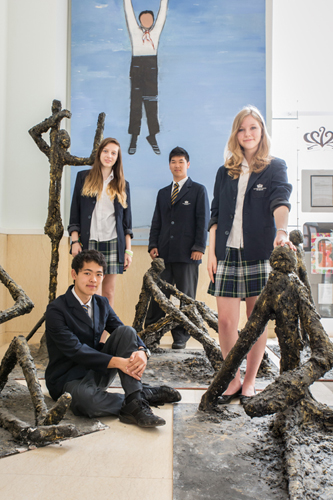
Rat meat sold as lamb. Cadmium-tainted rice. Melamine-tainted milk. Gutter oil. Glow-in-the-dark pork. What food hasn’t been tainted by scandal here? With poultry tentatively back on the menu after the avian flu scare and a continuing furor for imported milk powder, it seems a new food safety scandal emerges every month. Four Year 10 students from The British School of Beijing (BSB) gave us their thoughts on eating and drinking in a time of continued uncertainty.
Which food scandals have you heard about recently?
Julia: [Ikea’s] horsemeat scandal [in Sweden], but that wasn’t in China.
Kelvin: Milk is not safe.
Zoe: Because they put antibiotics in milk. I wouldn’t buy meat in China because they sell it really cheap, it’s not organic, and they don’t keep it sanitary. I don’t eat meat at all.
Julia: Often, there are meat scandals in Chinese restaurants where you can’t see the foods, like the meat in dumplings. Some foreigners say that they use rat meat, but surely not all places [do]; some have to be telling the truth. Sometimes, I think it’s just [an urban legend].
What other foods do you avoid in China?
Kelvin: Chinese milk. I drink Korean milk or milk from the US or other countries, so it’s more expensive.
Justin: I try to avoid things from vendors on the street, because you’re not sure where that’s been, so it’s better to go to supermarkets. I think the food is better in restaurants.
Julia: But you don’t know what they’re doing in restaurants.
Kelvin: At least you feel better about it.
Zoe: I don’t eat fruits here because they’re imported. Like strawberries; they don’t grow here and they probably spray them with pesticides.
What do you eat?
Zoe: Chinese vegetables, rice, and pasta.
Justin: I don’t think you can really do much about it, because every single food has a scandal. It’s impossible to keep track of everything. You just have to live with it.
Kelvin: If you want to avoid every single scandal, you can’t eat anything in China. Everything has a bad side to it, or it has chemicals in it. You don’t know which one is good or not. My family doesn’t avoid anything, but we try to get imported foods. I don’t think [unsafe foods]will damage you that much.
Julia: When my mom buys vegetables, she doesn’t buy them in the supermarkets, but from a lady in our compound. I don’t think those vegetables are treated [with chemicals], and they’re more local.
Zoe: The longer you live here, [the more]you get to know different restaurants and bakeries so you get comfortable with your choices.
Do your parents worry a lot about food safety?
Zoe: Yes, mine do. My mom taught me how to watch out with meat.
Julia: My parents don’t really like going to restaurants because you can’t watch them prepare the food. My mom cooks most of our food. If you know what’s in the food, you’ll be safe.
Justin: For fruits and vegetables, we take off the skin because we’ve heard that all the chemicals and pesticides are concentrated in the skin.
Julia: We do that too, except for tomatoes.
Recently, there was the avian flu scare. Did that affect the way your family prepared poultry?
Justin: Yes, a lot. We kept away from chicken and stuck to pork and beef.
Julia: I don’t eat meat, so it didn’t affect me. Only people who were in direct contact with birds were in danger.
Zoe: Everyone told me different things. My French teacher said that, as long as you cook the meat, you can eat it, and my mom said to stay away from pork and chicken. We didn’t eat eggs either. It’s better to take care and avoid chicken for a while.
Kelvin: Around that time, I wasn’t really paying attention to the news. I only heard about [avian flu]once the school started checking our temperatures before we got on the bus each day. It wasn’t a big deal, but I think there were more reports about it in other countries.
Zoe: It was fear and pressure from the media.
How do you feel about the food at school?
Julia: Our school buys all its vegetables from one farm, but the cheese is very processed, so I sometimes worry about eating that; I don’t know how many chemicals are in it.
Justin: I think the school tries to keep us pretty safe. During the bird flu [scare], they took all chicken and eggs off the menu.
Kelvin: The school takes more precautions with their food than we do at home because they don’t want their students to get sick from lunch.
Julia: They have our best interests at heart and try to provide a balanced diet.
Do you think bottled water is safe?
Kelvin: Some brands are not. With Nongfu Spring, there has been a small scandal about their water quality. My dad knows the owner of that brand, so it wasn’t a big deal [to us]because their water is the cleanest in Beijing; you can taste it.
Justin: It’s psychological; drinking bottled water makes you feel better about it. People think bottled water is better.
Julia: A lot of my friends don’t even drink water in Beijing. They say the water tastes strange, so they just drink Gatorade, soft drinks, and juice. These [factories]must have regulators and inspectors coming; they can’t just sell their product without people testing it beforehand.
Photo by Mitchell Pe Masilun
This article originally appeared on p50-51 of the beijingkids August 2013 issue.
Check out the PDF version online at Issuu.com



